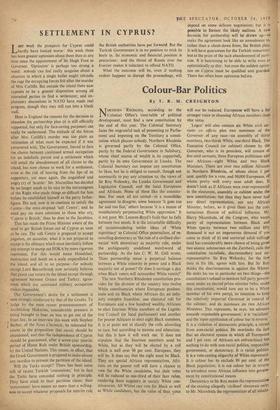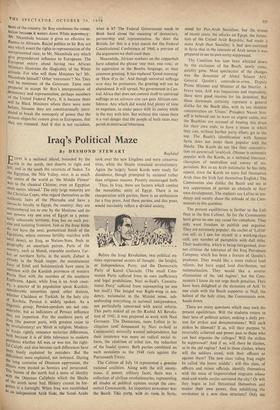Colour-Bar Politics
By T. R. M. CREIGHTON NORTHERN RHODESIA, according to the Colonial Office's time-table of political development, must find a new constitution by the end of this year. The Colonial Secretary faces the ungrateful task of presenting to Parlia- ment and imposing on the Territory a consti- tution which pleases nobody. Northern Rhodesia is governed partly by the Colonial Office, partly by the Federal Government in Salisbury, whose chief source. of wealth is its copperbelt, partly by its own Government in Lusaka. The Colonial Secretary can impose any constitution he likes, but he is obliged to consult, though not necessarily to pay any attention to, the views of Sir Roy Welensky, the Lusaka Government and Legislative Council, and the local Europeans and Africans. None of these like the constitu- tion. For once, all are united—in a monolithic agreement to disagree, some because 'it goes too far and too fast,' others because 'it is a means of mendaciously perpetuating White oppression.' It is not poor Mr. Lennox-Boyd's fault that he falls between two stools. It is the intractable difficulty of accommodating settler ideas of 'White suprerhacy' to Colonial Office paternalism, of re- conciling democracy as 'the rule of a civilised elec- torate' with democracy as majority rule, under the ambiguously undefined watchword of partnership. As the late C. W. M. Gel! wrote, 'Does partnership mean a perpetual balance between a White minority in power and a Black majority out of power? Or does it envisage a day when Black voters will outnumber White voters?'
The new Northern Rhodesian constitution pro- vides for the division of the country into twelve White constituencies where Europeans predom- inate and six Black where Africans do; an infin- itely complex franchise; one electoral roll for Europeans and a few hundred wealthy Africans to elect fourteen White members of the Legisla- tive Council (or local parliament) and another for poorer Africans to elect eight Black members. It is at pains not to classify the rolls aCcording to race, but according to income and education; but this is how it will work out. It does not stipulate that the fourteen members need be White, but as they will be elected by a roll which is well over 90 per cent. European, they will be. It does say that the eight must be Black. They are special African representatives. Afri- cans on the poorer roll will have a chance to vote for the White candidates, but their votes will be reduced to one-third of their face value, rendering them nugatory in mainly White con- stituencies. All Whites can vote for Black as well as White candidates, but the value of their votes will not be reduced. Europeans will have a far stronger voice in choosing African members than vice versa.
`Legco' will also contain six White civil servant ex officio plus two nominees of the Governor of any race—an assembly of thirty members, two-thirds White, one-third Black. The Executive Council (or cabinet) chosen by the Governor, who is its president, will consist of five civil servants, three European politicians and two Africans—eight White and two Black Ministers. There are over two million Africans in Northern Rhodesia, of whom about 1 per cent. qualify for a vote, and 50,000 Europeans, of whom pretty well every sane adult does. It doesn't look as if Africans were over-represented in the electorate, assembly or cabinet under the new constitution; but then they have never had any direct representation, nor any African Minister, before, so it gives them just the con- tumacious illusion of political influence. Mr. Harry Nkumbula, of the Congress, who wants parity of representation between Black and White (parity between two million and fifty thousand is not an ungenerous demand if you come to think of it) and universal adult suffrage (and has considerably more chance of being given two atomic submarines on the Zambesi), calls the constitution racialistic, discrimina't'ory and un- representative. Sir Roy Welensky, for the first time in his life, agrees with him. But Sir Roy thinks the discrimination is against the Whites. He stubs his toe in particular on two things—the constitution's refusal to institute full party govern- ment under an elected prime minister (who, under this constitution', would turn out to be a White member of his own party), its intention to keep the relatively impartial Governor in control of the cabinet; and its insistence on two African Ministers. This represents, he says, `no advance towards responsible government,' it is 'racialistic' and the 'open application of colour bar in reverse.' It is a violation of democratic principle, a retreat from non-racial politics. He overlooks the fact that an electoral system in which all Europeans and 1 per cent. of Africans are enfranchised has nothing to do with non-racial politics, responsible government, or democracy. It is racial politics. It is a vote-casting oligarchy of White supremacy. It is colour bar to exclude 99 per cent, of the Black population; it is not colour bar in reverse to introduce some African influence into govern- ment by constitutional means. Democracy to Sir Roy means the representation of the existing allegedly 'civilised' electorate onlY; to Mr. Nkumbula the representation of all inhabi- tants of the country. Sir Roy condemns the consti- tution because it waters down White supremacy : Mr. Nkumbula because it gives no effective in- fluence to Africans. Racial politics to Sir Roy are any which assert the rights to representation of the unrepresented race; to Mr. Nkumbula any which give preponderant influence to Europeans. The European outcry about having two African Ministers illustrates the illogicality of the White attitude. For who will these Ministers be? Mr. Nkumbula himself? Other 'extremists'? No. They Will be nominees of the Governor. Tame men prepared to accept Sir Roy's interpretation of democracy and representation, perhaps members Of the United Federal Party. It is because there Will be Black Ministers where there were none before because they are constitutionally intro- duced to break the monopoly of power that the Present oligarchic system gives to Europeans, that they are resented. And if this is not racialism, what is it? The Federal Government needs to think hard about the meaning of democracy, partnership and representation. So does the British, for this is a trial match for the Federal Constitutional Conference of 1960, a preview of the arguments we shall meet then.
Meanwhile, African workers on the copperbelt have adopted the phrase 'one man, one vote,' or its equivalent in the Bemba language, as their common greeting. It has replaced 'Good morning' or 'How d'ye do.' And though universal suffrage now may be premature, the greeting will not be abandoned. It will spread. No government in Cen- tral Africa that does not commit itself to universal suffrage as an ultimate aim can gain African con- fidence. Any which did would find plenty of time to negotiate, to make peace with its enemy while in the way with him. But without this vision there is a real danger that the people of both races may perish in interracial bitterness.



































 Previous page
Previous page